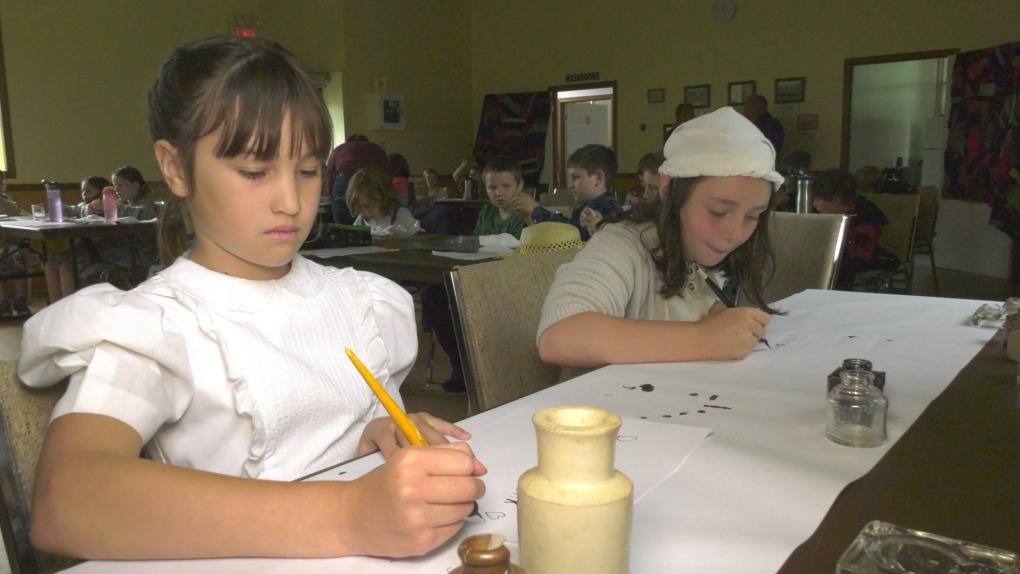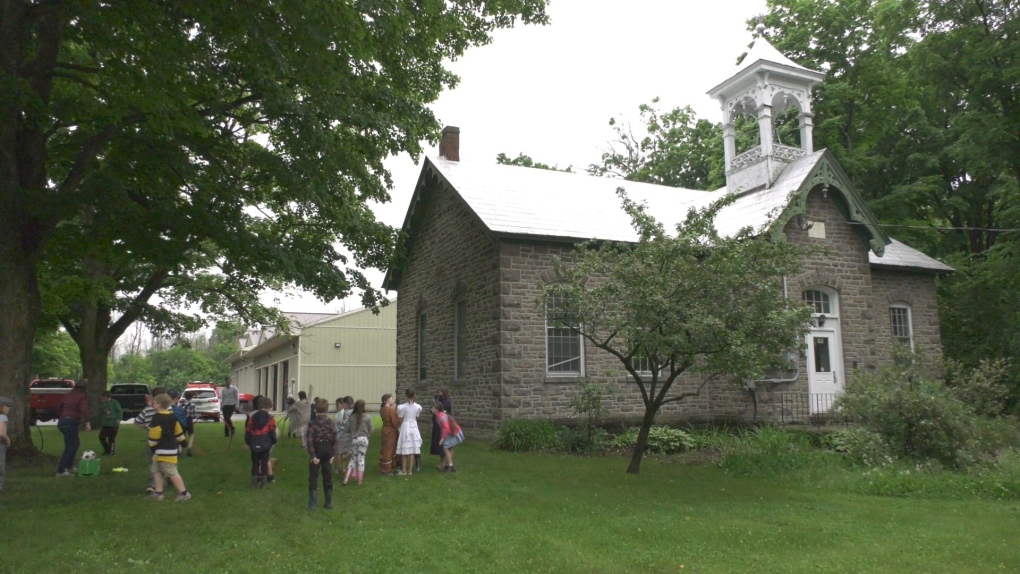Oxford Mills students experience what life was like in the 1800s
Students south of Ottawa took a trip back in time on Thursday to learn what school classes were like 150 years ago, with help from the local historical society.
The school bell atop Maplewood Hall, once a one-room school in Oxford Mills, welcomed Grade 3 and 4 students from Oxford on Rideau Public School, ready to experience what life would have been like back on June 9, 1876.
"Just for today it's 1876, the year just after the school was built," said teacher Steven Paterson.
The students have been learning what it was like for Canadians to live in 1700s and 1800s, and the former school was a perfect backdrop to let them experience it in real life.
"The past two months students have been researching what life was like at that time, so a big focus on what a school day was like, some recreational, and what a curriculum would look like," Paterson said.
Inside the hall, cursive writing was being taught with inkwells and calligraphy pens, and math was being done with chalk and chalkboards.
"It's brings it to life," Paterson said, pointing to a picture hanging on the wall of his grandfather, who attended the schoolhouse decades earlier. "You can look in a magazine or a text book and see pictures, but it doesn't mean anything until you can actually touch it and manipulate it, do something with it, just like any subject or a way of life."
 Students practice cursive using ink and calligraphy pens at Maplewood Hall in Oxford Mills, Ont. (Nate Vandermeer/CTV News Ottawa)
Students practice cursive using ink and calligraphy pens at Maplewood Hall in Oxford Mills, Ont. (Nate Vandermeer/CTV News Ottawa)
Paterson reached out to the North Grenville Historical Society to see if they would be interested in bringing 1876 back for the day, and they jumped at the chance.
"This historical society is just recently bringing in a children's program and this was a perfect opportunity to start this up," said Kerrie Kossatz, North Grenville Historical Society Treasurer.
"Right now, they are my guinea pigs today, but it seems to be going ok!" she smiled.
"It's great hands-on knowledge," Kossatz said. "Children today, everything just seems so disposable where we're throwing our clothes out and it's great to see that maybe they can learn to mend their clothes, to reuse, recycle. It's great to see the older things coming back to light now."
Some students like Mackenzie Paterson and Emery Wilson, even dressing the part.
"We did a lot of research and for two months and so we looked up what to wear," Paterson said.
"My mom had this (dress) from a play when she was younger so I just wore it," added Wilson.
"That was another area of focus, was the clothing," the teacher added. "How the students and teachers were dressed at the time so students were encouraged to dress the part and a lot were very excited about that and as you can see, they have."
Outside, the class was shown historical games at recess like duck on a rock, hoop rolling, hopscotch and marbles.
Even through the on and off rain showers, kids were having fun learning the games.
"We joked about, this," said Paterson. "I said this morning how there would be a snowstorm or a blizzard or rain, you got to get to school someway. We're travelling by foot and we made the best of it!"
Students also learned how to sew and how to make bannock, a quick flat bread that does not need time to rise.
 Gwenda Lemoine shows off some antique artifacts at Maplewood Hall in Oxford Mills, Ont. (Nate Vandermeer/CTV News Ottawa)
Gwenda Lemoine shows off some antique artifacts at Maplewood Hall in Oxford Mills, Ont. (Nate Vandermeer/CTV News Ottawa)
Gwenda Lemoine, who has a granddaughter in the class, brought in historical items for show and tell like a bed warmer and a butter press.
"They know a little bit of history," Lemoine said. "I sunk them on the bed warmer, but they had some good answers!"
"I just think it's fantastic, I really do, that they go to that initiative to try to replicate what it was like back then," she said.
"They are just old things that I thought the kids might be interested in. I always loved history and I think it's great that Mr. P is doing this," she said. "I wish more people would because it's important that the kids know where they came from."
Lemoine even brought in her most prized possession: a musket bullet her husband found while he was remodelling their 150-year-old log home.
"We figured it is from 1772 when we figure out the girth of the log in my house," she said.
Grade 4 student Walter Hamilton said they learned how tough it was to live and grow up in that era.
"They didn't have a lot of money," Hamilton said. "They're only getting like two cents each day they worked."
 Students play historical games at recess during a day at Maplewood Hall in Oxford Mills, Ont. (Nate Vandermeer/CTV News Ottawa)
Students play historical games at recess during a day at Maplewood Hall in Oxford Mills, Ont. (Nate Vandermeer/CTV News Ottawa)
Paterson says the aim is to keep the partnership going, and have a yearly trip to the old schoolhouse as part of the lesson.
"Learning should be fun and it's good that they are able to learn from this and have fun with it," he noted. "Hands on, real life experience and just let them absorb it and let the memories start today."
"Seeing the kids come to life, if you were to do in a classroom and read a textbook it's, sure, it's interesting, but it can kind of get old and stale," he added. "Knowing how much they looked forward to it for the past two months, asking questions about it, it's great."
However, even with their newfound knowledge of 1876, Grade 4 student Easton DeVries was quick to answer if he's like to be in a classroom like this every day.
"Nope!" he smiled.
CTVNews.ca Top Stories

LIVE B.C. seeks ban on using drugs in 'all public spaces,' shifting approach to decriminalization
The B.C. government is moving to have drug use banned in 'all public spaces,' marking a major shift in the province's approach to decriminalization.
Air traveller complaints to Canadian Transportation Agency hit new high
The Canadian Transportation Agency has hit a record high of more than 71,000 complaints in a backlog. The quasi-judicial regulator and tribunal tasked with settling disputes between customers and the airlines says the backlog is growing because the number of incoming complaints keeps increasing.
Orca calf that was trapped in B.C. lagoon for weeks swims free
An orca whale calf that has been stranded in a B.C. lagoon for weeks after her pregnant mother died swam out on her own early Friday morning.
AFN chief says Air Canada offered a 15% discount after her headdress was mishandled
After the Assembly of First Nations' national chief complained to Air Canada about how staffers treated her and her ceremonial headdress on a flight this week, she says the airline responded by offering a 15 per cent discount on her next flight.
Sophie Gregoire Trudeau on navigating post-political life, co-parenting and freedom
Sophie Gregoire Trudeau says there is 'still so much love' between her and Prime Minister Justin Trudeau, as they navigate their post-separation relationship co-parenting their three children.
U.S. flight attendant indicted in attempt to record teen girl in airplane bathroom
An American Airlines flight attendant was indicted Thursday after authorities said he tried to secretly record video of a 14-year-old girl using an airplane bathroom last September.
76ers All-Star centre Joel Embiid says he has Bell's palsy
Philadelphia 76ers All-Star centre Joel Embiid has been diagnosed with Bell’s palsy, a form of facial paralysis he says has affected him since before the play-in tournament.
DEVELOPING Bird flu outbreaks: WHO weighs in on public health risk
The current overall public health risk posed by the H5N1 bird flu virus is low, the World Health Organization said on Friday, but urged countries to stay alert for cases of animal-to-human transmission.
Island near Mull of Kintyre for sale for US$3.1 million
An idyllic 453-acre private island is up for sale off the west coast of Scotland and it comes with sandy beaches, puffins galore, seven houses, a pub, a helipad and a flock of black-faced sheep.






























